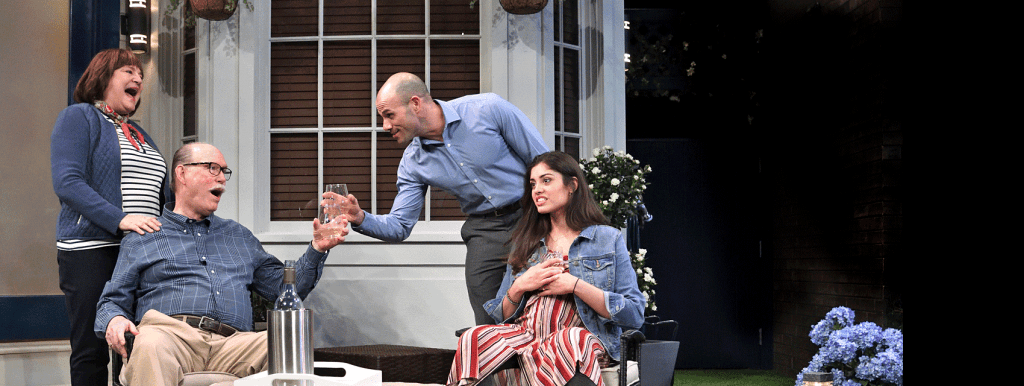
2/8/19
By Rebecca Noon
In my role as the artistic associate for community, I pursue potential community partners, reaching out to people who may never have considered a partnership with Trinity Rep. Every once in a while someone reaches out to me, and very clearly says, “I see how theater might be useful for my community. Can we partner?” When that happens I sit up and take notice. This is how I met Mary Harrington, a board member for the Mental Health Association of Rhode Island (MHARI) and our community partner liaison for the Macbeth Context & Conversation. Mary approached me before a performance of Ragtime last spring, and it was clear we needed to work together. After a few meetings over the hot summer months, we decided Context & Conversation for Macbeth would be the ideal partnership. Context & Conversation is Trinity Rep’s partnership with Providence Public Library (PPL) that brings scholars, artists, community practitioners, and audience members to a community setting related to the themes of the play in order to explore the ideas found in the play currently on stage at Trinity Rep. Trinity Rep’s Conversationalist-in-Residence and PPL’s Programs and Exhibitions Director, Christina Bevilacqua sat down with Ruth Feder, MHARI’s executive director at the time, to chat about what makes Ruth and MHARI most excited for this upcoming collaboration.
Christina Bevilacqua: Tell us about the Mental Health Association of RI — what is your mission and who do you serve?
Ruth Feder: MHARI is a 501(c)(3) organization that is an affiliate of Mental Health of America. Established in 1916, our mission is to promote mental health, prevent mental illness, and to improve the system of care for mental health through advocacy, education, service, and the dissemination of research. We accomplish this a few different ways: The RI Parity Initiative is a public awareness campaign to educate Rhode Islanders about mental health parity. Parity laws require that in most cases, health insurance for mental illness, including addiction disorders, must be the same as coverage for other medical conditions. We work to eliminate stigma by spreading the word that mental illnesses are no less real, no less serious and, often, no less lethal than other medical conditions, MHARI works to free mental illness from the shackle of stigma. MHARI can also be found in the halls of the State House and various policy-making bodies, working hard to represent the voices of people who live with mental illness through legislative and policy advocacy. Through educational programs, MHARI educates the public about mental wellness and mental illness. One program led by MHARI, along with a community planning committee, is May is Mental Health Month. The month of events begins with a kickoff held at the State House, followed by events held across the state throughout the month. MHARI coordinates these events and creates a statewide calendar of events.
CB: What were your thoughts when Trinity Rep reached out about having the MHARI partner on a Context & Conversation event for Macbeth?
RF: Our first thoughts were that this is very exciting — and unusual — collaboration. Typically, our collaborations are with other advocacy or mental health provider organizations. For us to have an opportunity to be part of this cultural event is something for which we are very grateful. It is also a thrill for MHARI to be working with you! Your dad was, for many years, a member of MHARI’s board of directors. The late Joe Bevilacqua, Ph.D., is a legend in the mental health community and is fondly remembered as a visionary who helped transform the mental health landscape in Rhode Island. We are also proud that historic Butler Hospital, one of the first psychiatric hospitals built in the US, is part of this community partnership with Trinity Rep and will house this exciting community conversation. Theater can play a powerful role in addressing the stigma around mental health issues. People living with mental illness often acutely feel the stigma and are filled with self-loathing and despair believing they are to blame for their mental health struggles. Realistic and accurate portrayals in plays of what it is like to live with a mental illness or be treated at a psychiatric hospital — not a mental institution as they are too often called — can help audiences see that people living with mental illnesses can recover and live purpose-filled and productive lives just like everyone else.
CB: My dad loved working with MHARI! And he also loved theater, I think both fed his interest in understanding people’s lives. He introduced me to plays at a young age, and I have so many memories throughout my life of attending and discussing productions with him and my mom, including many at Trinity Rep. So this is a special collaboration for me as well. And speaking of understanding people’s lives, what are the biggest misconceptions that people have about mental illness?
RF: There is a most unfortunate — and dangerous — misconception that mental illnesses, including addiction disorders, are either volitional (in other words, within the control of the person) or that they are not “real” illnesses. Both of these are totally false. Mental illnesses are biochemically-based illnesses that can affect mood, thoughts, feelings, and/or behavior. Research and science are making advances in the field of mental illness; yet, because the symptoms and diagnoses are typically not diagnosed by tools such as x-rays or laboratory tests, it is often assumed that they are not real. Mental illnesses are no less real, no less serious, and often, no less lethal than other medical conditions. There are other simple activities that aren’t thought of as promoting mental wellness but, in fact, go a long way to helping children achieve mental health. Creating school and family environments that foster positive communication and caring can provide a foundation for healthy self-esteem. This can give children the tools they need to successfully navigate a stressful world.
CB: I know that you are a Shakespeare fan — can you tell us how you got bitten by the Bard bug? What is it about his work, and Macbeth in particular, that speaks to you?
RF: The themes of mental illness that run through Macbeth fascinate me because, at the time Shakespeare wrote the play, very little was known about mental illness. In fact, most often symptoms that we now know to indicate a mental illness, were thought of as “madness.” It is so interesting to apply current knowledge about mental illness to the sympomatology displayed in Macbeth.

CB: Are there particular themes or characters or situations in Macbeth that connect to the issues that the MHARI addresses?
RF: There are themes of mental illness that pervade Macbeth. Through the lens of our 21st-century knowledge about mental illness, a mental health professional today would likely identify some of the statements and behaviors of Lady Macbeth as suggestive of mental illness. Although not definitive, her death suggests the possibility that Lady Macbeth died by suicide. If Lady Macbeth were alive today and contacted us with concerns, we would refer her to clinicians who would not just read about her but would meet with her and, if desired, also with her family, to recommend the best course of treatment tailored to her needs. Lady Macbeth would benefit from the advocacy work of MHARI that seeks to improve access to quality, affordable, mental health services.
CB: What are the most important ways people in the community can help the challenges faced by people living with mental health issues in Rhode Island today and why is it important that they get involved.
RF: People need to realize that they — or someone they know — is likely to experience mental health issues in their lifetime. Approximately one in five adults experience mental illness in a given year. The stigma that still persists around mental illness prevents some people from seeking the care they need. It is imperative that people recognize the signs of mental illness and, rather than dismissing it or ignoring it, that they encourage someone experiencing a mental health crisis to get immediate help. Untreated mental illness, including addictions, can result in suicide or lethal overdoses. No one should have to go through this alone.
If you or someone you know needs treatment, please call or visit the state’s new 24-hour adult triage center for confidential crisis intervention and to be connected to ongoing treatment: additional information can be found at www.bhlink.org or by calling (401) 414-LINK.
Context & Conversation for Macbeth will be held on Monday, February 11 at 6:30 pm at Butler Hospital, Ray Conference Center, 345 Blackstone Blvd., Providence. The event is free and open to the public

